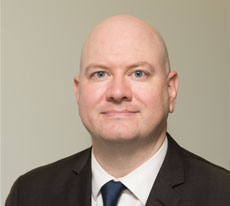 In the latest City Talk, Daniel McCarthy discussed the state of the Democratic party, the media’s continued misunderstanding of Donald Trump’s supporters, America’s crisis of legitimacy, and more with Charles F. McElwee, assistant editor of City Journal. McCarthy is director of journalism fellowship programs at The Fund for American Studies and the editor of the intellectual quarterly Modern Age. He is a columnist for The Spectator’s U.S. edition, and his work appears in publications ranging from the New York Times and The National Interest to The New Criterion and First Things. He was previously editor of The American Conservative and a senior editor for ISI Books.
In the latest City Talk, Daniel McCarthy discussed the state of the Democratic party, the media’s continued misunderstanding of Donald Trump’s supporters, America’s crisis of legitimacy, and more with Charles F. McElwee, assistant editor of City Journal. McCarthy is director of journalism fellowship programs at The Fund for American Studies and the editor of the intellectual quarterly Modern Age. He is a columnist for The Spectator’s U.S. edition, and his work appears in publications ranging from the New York Times and The National Interest to The New Criterion and First Things. He was previously editor of The American Conservative and a senior editor for ISI Books.
We’re less than a month away from the Iowa Democratic caucuses. What have we learned from the Democratic presidential primary?
We’ve learned that class war and electability count far more than identity politics, even with Democratic constituencies. Pundits are horrified that the Big Four heading into Iowa and New Hampshire—Joe Biden, Bernie Sanders, Elizabeth Warren, and Pete Buttigieg—are all white, and even Buttigieg’s homosexuality hasn’t exempted him from criticisms that he’s just too “normie.” Warren has lost ground as she’s played up identity politics; her appeal, like Sanders’s, is primarily economic. Identity politics is an elite obsession but useless baggage, or worse, where voters are concerned.
What does the press misunderstand about President Trump’s supporters?
Everything—but most of all the importance that voters attach to having a leader who’s willing to fight. Trump’s working-class supporters would rather fight a trade war and lose, if it comes to that, than surrender their jobs and communities without a struggle. And they’ll stick with Trump as long as they think he’s sticking up for them—win or lose. This applies to foreign policy, too: Trump’s critics think that he’s not tough enough on liberalism’s enemies around the world, but his supporters think that the conflicts that both parties have involved us in over the last 30 years aren’t being fought for ordinary Americans and can’t be fought honestly—that is, to win—under the foreign-policy establishment in either party.
What is the greatest challenge confronting post-industrial communities?
A lack of representation, both in politics and in media. And attendant on that, a lack of negotiating power. These communities need leaders who will drive the hardest bargains possible on their behalf. But they have no leaders, and no institutions that could give rise to leaders—they’re not organized as political and cultural forces. Radical identity politics, by contrast, which has few real-world supporters, is highly institutionally organized, and we see the consequences of that every day—in law, the workplace, and the climate of opinion.
In The Spectator, you recently wrote about the Democratic Party’s evolution in a “post-Christian America.” How will an increasingly irreligious nation shape our future?
Right now, an irreligious elite with institutional power is the greatest problem: fundamental questions of religious conscience are incomprehensible to many of the people in government agencies, education, and corporate America who make the rules by which everyone else must live. The political consequences of popular disaffiliation with religion are likely to involve further loss of representation by non-elite groups: religious leaders once had some role as spokesmen for communities of work and place, as well as family. It’s one more channel of organization and negotiation that’s closing.
What is an overlooked trend occurring in the U.S.?
A crisis of legitimacy. Terms like “tribalism” and “polarization” are misleading when used, as they usually are, by a self-interested, college-educated class to dismiss the interests of other portions of the population. Leaders in politics, business, education, the media, and religion have all failed to sustain legitimacy in the eyes of their constituents, and decades of searching for new ways to sew the head back onto the body have yet to find one that works. The very things that our leaders consider marks of their fitness to rule—their cosmopolitan outlook and unshakeable faith in social science—are barriers to reconnecting with the public.
What are you reading?
Without intending to make it a season of French literature, I interrupted reading The Red and the Black to read Michel Houellebecq’s Serotonin over Christmas, and now I’ve returned to Stendhal. I’ve also started on William Dalrymple’s history of the British East India Company, The Anarchy, though what I’d really like to read is a history of the Dutch East India Company, or an overview of early modern Dutch politics and economics more generally. I’ve been boning up on maritime empires and the ties between commerce, republicanism, and developments in culture and philosophy.
Top Photo by Scott Olson/Getty Images
